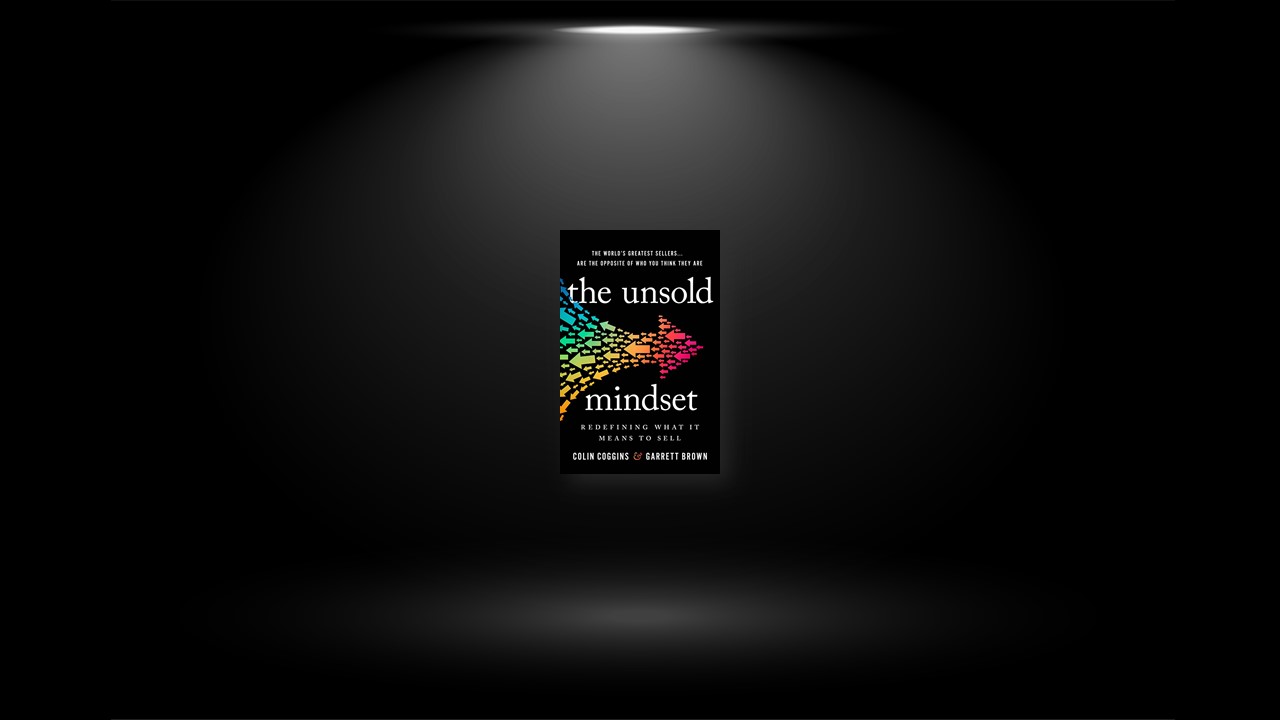You Can’t “Act” Authentic
A great irony about being authentic is that, given the cultural messaging we’re exposed to about putting on personas, it can be challenging to start truly being ourselves. For one thing, what will our colleagues think if we suddenly start showing up as someone different? Won’t we be vulnerable? Won’t rejections be even harder to take if we’ve shown our true selves in the selling process? What if we’re boring?
It sounds a little crazy, but showing up as the most authentic version of yourself will probably at first be somewhat like learning how to meditate. Not dwelling on thoughts sounds easy, until you sit still for fifteen minutes and try not to dwell on any thoughts. It’s like saying “don’t think about giraffes” to someone. Once you tell them that, they can’t think of anything but.
As you work to put away the persona for good, give yourself permission to try some things that seem out of your comfort zone. When you mess up or sound awkward in front of a customer, acknowledge it. And when something feels right, like it’s authentically you, lean into it. If you change how you think about what it means to sell, give yourself permission to do it your way, and keep at it, you’ll find it becomes genuinely liberating.
Intentional Ignorance
Paul McCartney is considered by many to be the greatest songwriter of all time. He’s written a mind-blowing number of iconic songs, including “Yesterday,” “Hey Jude,” and “Let It Be.”
From his earliest days, McCartney was unsold on what he needed to know to be a great musician. He took the stereotype of a technically perfect music prodigy and flipped it on its head to become a legend on his own terms. He focused on what he loved, learning by listening to blues greats and rock and roll pioneers and collaborating with John Lennon, and the world loved him (and his music) for it. His intentional ignorance of traditional music composition was a feature, not a bug.
Staying intentionally ignorant in any aspect of our lives, including selling, doesn’t mean we aren’t doing the hard work. Giving ourselves permission to let go of the pressure of having to know everything ensures we have the bandwidth to work our asses off on the things that allow us to have the most impact and make us the happiest. It makes us better because we aren’t burdened with the things that don’t allow us to show up as the best version of ourselves for the people we’re interacting with. It also frees us up to be open to new information, ideas, and opportunities that are aligned with our dharma when they come our way.
Growing into an Unsold Mindset
The Unsold Mindset naturally fosters opportunities to be more growth-minded, to see abundance instead of scarcity, and to be a creator instead of a victim. For elite sellers, adopting that mindset isn’t just about selling more. It’s about growing into the person and seller you want to be, not the one you’re “supposed” to be. Approaching sales as a tool for learning allows you to thrive both professionally and personally and empowers you to become deeply engaged in and satisfied by your work, feel a strong sense of purpose, and relish in the real growth you have the chance to experience every day.
Fear is “non-acceptance of uncertainty; if we accept the uncertainty, it becomes adventure.” Sellers with an Unsold Mindset cherish growth. Instead of fearing challenges, rejections, and uncertainty, they know they are part of the journey. The world’s greatest sellers view life the way they view sales. They see almost any moment as an important moment, good or bad. They don’t predicate their celebrations on success, they celebrate based on impact. And any important moment can have an impact. This outlook helps them find meaning in their careers and their lives.
Pathological Optimism
You’ve probably never heard of Dr. Katalin Kariko, but her work has almost certainly impacted your life. Dr. Kariko is a biochemist. In the early 1990s, she started working on technology that would eventually evolve into the mRNA technology used for vaccines, including the COVID vaccine.
She was denied funding, in part because she was “selling” her research against far more popular technologies and “working in the shadow of the gene therapy and people who work with DNA.” Progress on her work was painfully slow and incremental, for which she was demoted or fired several times. Despite these roadblocks, she never stopped being optimistic. “You will see, every picture [from that time], I’m smiling. I was happy.” In large part, this optimism stemmed from her genuine belief that what she was trying to do would work. “I could see that it would be good for something,” she said, “that’s what was driving me.”
Dr. Kariko trained herself to remain optimistic in the face of her challenges. She didn’t ignore reality when it knocked her down; instead she got back up. She figured it was just a matter of time, and trusted that if she did the work, sold herself and her ideas to people who cared about the work she was so vigorously optimistic about, she’d eventually accomplish the scientific progress she’d set out to accomplish. This is how people with an Unsold Mindset use optimism to change the way they sell.
One of the most important findings in the history of psychology, discovered over the past couple of decades by neuroscientists, is that the brain is malleable. It continues to grow new brain cells throughout our lives, and we can consciously shape how it grows, developing habits we want and suppressing ones we don’t, such as anxiety or depression.
If our thinking is dominated by negativity, we’ll reinforce the neural networks of pessimism. The same is true for positive thoughts strengthening the networks that support optimism. We’re never going to entirely avoid falling into bouts of negativity, but through activities like disputation, starting with yes, and practicing gratitude, we really can engineer our minds to look for the good much more often. Which, of course, means we’ll start finding the good more often, too.
Be a Teammate, Not Just a Coach
In his book Wanting, Luke Burgis says, “Transcendent leaders don’t insist on the primacy of their own desires. They don’t make them the center around which everyone and everything must revolve. Instead, they shift the center of gravity away from themselves and toward a transcendent goal, so that they can stand shoulder to shoulder with others.”
The same way the leaders Burgis describes “shift the center of gravity” from themselves to a bigger goal, sellers with an Unsold Mindset take the focus away from themselves, their company, or their product, and shift it toward the outcome that’s best for their customer.
Being on the same team and conditioning yourself to stay in that mindset consistently will almost surely take some practice. The cultural conditioning to treat selling as a game, with prospects as adversaries we’re supposed to defeat, is programmed into most of us, even if only subconsciously. But as you keep reminding yourself to be on the same team, not because you have to, but because you enjoy the interactions that result from it, the approach becomes a habit. You’ll start seeing all sorts of opportunities to partner with prospective customers and unexpected ways to work together toward common goals. They’ll also start to reciprocate. More importantly, the act of selling will shift from being an endless series of contentious battles into a collection of meaningful connections that make the entire process a whole lot more fulfilling.
Transform, Don’t Transact
The Hebrew word mitzvah means a “good deed.” As two guys raised by amazing Jewish mothers, we heard the word mitzvah a lot growing up, but it wasn’t until a student of ours sent us a blog post by Rabbi Alexander Seinfeld that we realized how well that word describes the transformational giving of the Unsold Mindset, and the positive effects that so often follow. “A mitzvah,” the rabbi wrote, “is a certain type of transcendent connection that you create when you do some actions (such as good deeds) with the right frame of mind” (emphasis ours).
The frame of mind he’s referring to is one of consciously choosing to do something for someone else, not because you feel you’re supposed to, or because you’ll benefit from doing it, but purely with the intention of doing good. Each mitzvah you offer someone, he says, “is a unique opportunity to give your life transcendent meaning.”
We thought immediately of how an Unsold Mindset helps transcend the limits of transactional thinking, and of the “transcendent connection” it allows sellers to make with the people they sell to. By going beyond what’s expected and instead seeking to be a catalyst for transformation, big or small, they don’t just make deals better, they make us better. In the process they lift themselves up too, enriching their lives through the relationships they build and the impact they have on the people they encounter along the way.
Set Goals on Purpose
Since the early days of building Microsoft, Bill Gates has been guided by purpose. Immortalized in Microsoft’s mission statement, his purpose is “to empower every person and every organization on the planet to achieve more.” Looking at all he’s accomplished in his career (and beyond), it seems clear his goals were all driven by this purpose. The goal to have “a computer on every desk, in every home” is certainly germane to helping everyone on Earth “achieve more.” So are his current projects aimed at eradicating poverty, preventable diseases, and world hunger.
When you approach life with an Unsold Mindset, setting and achieving purpose-driven goals, you’re no longer on the treadmill, you’re climbing the mountain you chose, looking forward to scaling the next set of peaks you’ll see from the summit. You won’t be discouraged by the fact that as soon as you achieve one goal you’re going to immediately get started on the next one. You’ll want to keep going, testing your limits, using all your talents, learning what you’re capable of. You’ll feel the value and impact of your efforts every day, for you and for others. And when it comes to selling, you’ll be constantly reminded that for you, the work is about so much more than closing deals and hitting numbers. When done the right way for the right reasons, selling can be one of the most powerful instruments for doing good in this world.


